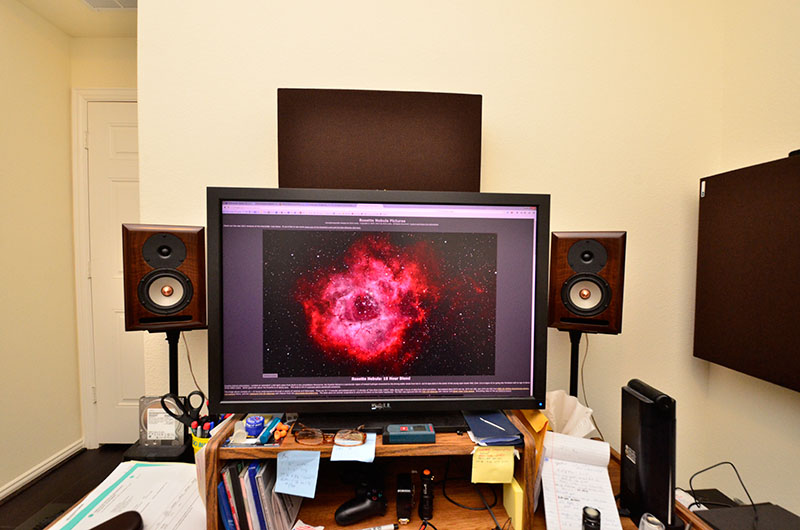
Desktop Audio Setup
Audio Visual
"Stereo" Stuff - Speaker Quest(s)
Copyright
© 2014, 2015,2017, 2018 by Dick Locke
Old Comcast remote stuff is at the bottom of the page!
My music & video links page is here.
This page has pictures and information about audio and video topics. I start with a discussion of my nearfield search, but you can skip directly to my greatroom system information by clicking here. My home theater room beginning to end process is here.
First, here are some excellent links about setting up and measuring your audio system.

(GIK acoustic panels behind and to right of monitor shown, Rythmic F12 subwoofer is to the right)
I spend a lot of time on the computer, especially working with my photography and astrophotography, and greatly enjoy listening to music while doing so. I am fortunate to have a dedicated "computer room" that is in a far corner of the house, so I can listen at reasonably high volumes without disturbing everyone else too much. The layout of the room dictates that the speakers need to be very close to the front wall, and located between my 30" monitor. The computer room is roughly 11x10x11 (a "small" room at around 1100 cu. ft.) with laminate (hard) flooring. A 4x6 rug and thick pad was added in Jan 2015. One positive is the ceiling to wall interfaces are not square. See below for a picture. I listen different types of music and radioparadise.com is very representative of my tastes.
The speakers you are familiar with have a huge influence on how you perceive other speakers.
Car: I spend about 1.5 hours/work day commuting in an Acura MDX with a their top-of-the-line audio package (Acura/ELS Surround®32 410-watt Premium 10-speaker Sound System that includes a subwoofer). I run the Acura audio with everything in the flat/default position; I'm sure it's tuned with a bass boost to help overcome road noise. I find the Acura sound to be pretty neutral in the mids and highs, along with a strong but polite bass.
Living Room: I've had a pair of Snell E3's (Snell Type E/III) for 20 years as the main living room speakers (the main Snell dude Kevin Voecks is now at Revel). Snells and the E3's were always well-received by Stereophile (their review is here). I find the E3's have a detailed treble and nicely prominent mid-bass, and ran without a subwoofer. Our entertainment system ran PSB alphas and a 200C center channel with a Definitive Technology 15" sub for years. I would say I liked the sound of the PSB's and the Snell's on a most material. The Snells could be unforgiving of poor recordings in the treble region, and I wanted to get something that was "accurate and smooth" the higher frequencies. More recently I went with Ascend Sierra Tower & Horizon speakers in the AV setup as described on this page as the main living room speakers. Those speakers fire directly into our open kitchen, so while it's not always critical listening, we listen to them a couple hours a day.
Computer Speakers: I have had various "computer speakers" over the years, such a a Klipsch THX 2.1 system that sounded pretty good. I decided to try a 5.1 system when I ended up with an extra A/V receiver, and ran an Energy Take Classic 5.1 system for a few years. The front three speakers sat on a large hutch. That was fun for a while with the surround speakers and all, but wasn't really high fidelity. I decided it was time for my midlife crisis computer speaker purchase and decided to go with a top quality 2.1 system.
One of the first questions I had to address was to go active (powered speakers) or passive (where an external receiver or amp would power the speakers). I had the ability to go passive without purchasing additional equipment; on hand I had a decent Yamaha receiver, as well as a Parasound 2100 two channel pre-amp with (sub crossover & sub out options) and an old Cinepro "Six-Hundred Watt Theater Amplifier." Active speakers have some significant advantages; they can be run directly out of the computer's audio output and are typically designed for a nearfield/desktop environment. Most "computer speakers" are junk these days, in my opinion, there has been a race to sell OK speakers at low price points. The home recording market offers a lot of hope, however; there are a number of reasonable to very high priced & high quality powered monitor options out there (Genelec and Adam are big names.)
I was considering Goldenear speakers from my entertainment room setup (described in a dedicated section below) and chanced upon a used pair of Goldenear Aon 2 speakers & Polk 10" sub for a good price. I ditched the hutch on my desk and acquired some inexpensive stands to keep the speakers off the desk. I checked the Aon's out over labor day 2014 and found there there was just too much bass from the Aons for them to be viable for the desktop, they gave me a headache. I did like the sound of the folded ribbon tweeter, though. I also grabbed my old NHT Super Zero speakers from their bedroom surround duties and tried them for a bit. Mated with the Polk sub they sounded very pleasant. This would be a nice, inexpensive passive setup for the budget-minded, but I was looking for more. The NHT's went back to surround duty.
Continuing my search, I used the Innerfidelity desktop wall of fame as a basis for speaker consideration, as well as many hours of internet reading.
I went to the local Guitar Center and listened to some Adam F5’s (powered monitors with a ribbon tweeter, meant for mixing) and decided to give them a try despite them not sounding that great in the store (lots of mid-bass). I envisioned them as maybe an interim solution. My first home listening impression was too much mid-bass and I was going to need to return them. But I had time before deciding, and I went about tweaking the placement, sub and crossover. I found by pulling the speakers out from the wall just a bit and crossing over at 80 hz the sound was much improved. I also really liked the sound of the ribbon tweeter. But the deep bass just wasn't there with the Polk Sub, so time to address that.
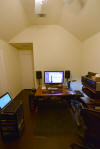
The Room & Nearfield Setup with Adam F5's & bare walls (click thumbnails to enlarge)
The Innerfidelity Adam F5 review is here.
Just as with speakers, there are way to many subwoofer choices out there. Having been looking at Ascend Acoustics for the entertainment center, I became familiar with Rythmik's sealed products that target audiophiles looking for low distortion bass in music applications. I pulled the trigger on Rythmik F12 sealed 12” subwoofer and couldn't be happier with it.
Seeking to upgrade the Adams, and with Christmas approaching, I commissioned a pair of Salk WOW1 mini monitors from Salk Sounds. As with Ascend, I was strongly considering Salk speakers for the entertainment center and was familiar with their offerings (and the glowing Innerfidelity review). I ordered the WOW1's in November with a "rush" to insure delivery by 12/12/14.
I replaced the Adams with the Salks, did some basic sub level setting, and put on my primary audition track Van Morrison's Tupelo Honey. My first reaction was whoa, way too much tape hiss! There wasn't much bass, either, though the mids and voices sounded excellent. But overall the overall impression seemed quite bright and not what I was looking for. What's going on here?
Let the tweaking and experimenting begin!

Salk WOW1 Setup (pre-Acoustic Panels)
The Salk WOW1 Innerfidelity review is here.
I had expected the WOW1's to knock the socks off the F5's but that wasn't the case at first. I swapped them in and out, and also tried the WOWs in our home theater/bedroom setting, comparing them with the Snells and Goldenears. I also broke out REW (Room EQ Wizard) and Equalizer APO in an attempt to see/understand the frequency response data and mitigate the issues I was hearing. Summarizing a lot of experimentation:
While Equalizer APO can be used the tame the treble, I found efforts in that area unsatisfactory. I'm fine doing that for bass issues where every room has problems, but I want speakers that don't need EQ in the mids and trebles.
The listening room had bare walls and this significantly contributed to the brightness experienced with the Salks as those tweeters have a wide dispersal pattern.
The Adam F5's are a very good speaker with a nice smooth top end. All else being equal and flat, the WOW1's produced measurably and audibly more treble than the Adams at my listening position.
Transients on the WOW1's are superior to the Adams.
The WOW1's sounded a lot better (i.e., more balanced) in the bigger room with carpet and away from the site walls; the closer to the back wall the better, imaging was excellent when pointed at the listening position.
I spent a good deal of time working to find the best integration between the WOW1's and the sub; the sweet spot seems to be at an 80 Hz crossover point using the hi-pass outs. I am able to clean up the 20-200 Hz region quite nicely with REW/EQ APO. I set the sub level and the speaker cal level to be equal running all speakers at once, then take 9 to 12 readings from slightly different listening positions, and finally use REW to generate the bass filters from the averaged readings using the default 1.8 dB rise from 100 Hz to 20 Hz.
The low bass with the WOW1's and Rythmik sub, after the tweaking described above, is flat to below 20 Hz and awesome.
I let Jim Salk know that I was finding the speakers too bright and described the tape hiss. Jim was very helpful and offered to work with crossover guru Dennis Murphy to see what could be done to tweak the crossover settings to improve the sound I was experiencing. Jim sent me a resistor package and clear instructions as to how to splice a resistor into the tweeter's positive lead (no soldering required!) The two ohm resistor knocked the tweeter level down about 2 dB (too much), and the one ohm about 1 dB, which seemed about right.
It was now to the point where I thought the WOW1's with the 1 ohm cut might be better than the Adam's, but I also decided to pursue some bass traps and room acoustic treatments. Jim very generously extended my evaluation time to allow for this.
The acoustic panels made a significant difference in taming the top end of the WOWs. There's a panel between the speakers as well as at the left and right first reflection points.
The WOW1's are clearly outstanding speakers, was still not sure they are right for my situation after all the above.
When Ascend announced a sale on "b-stock" Sierra 2 monitors, bringing their price down to the Salk's, I decided to grab a pair and compare.
I auditioned the Sierra 2's at my desktop extensively, and also checked them out in our bedroom (which is a re-purposed home theater room). They simply did not do as well as the Salks in the nearfield desktop setup. I think the Salk front port design is a big plus for this type of setup. I did like the Sierra 2s in the bigger room, however, so they ended up replacing my old (and much larger) Snell E III's there (plus a subwoofer!).
The pictures should give you a good idea about the room and setup.
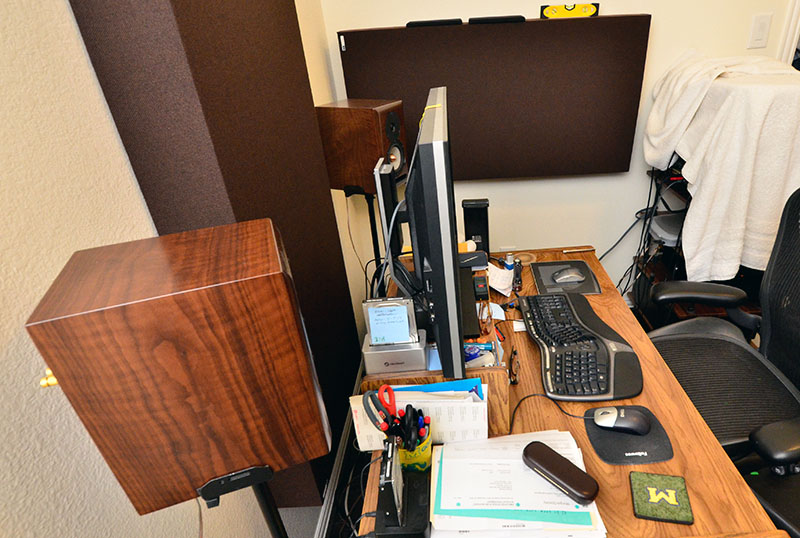
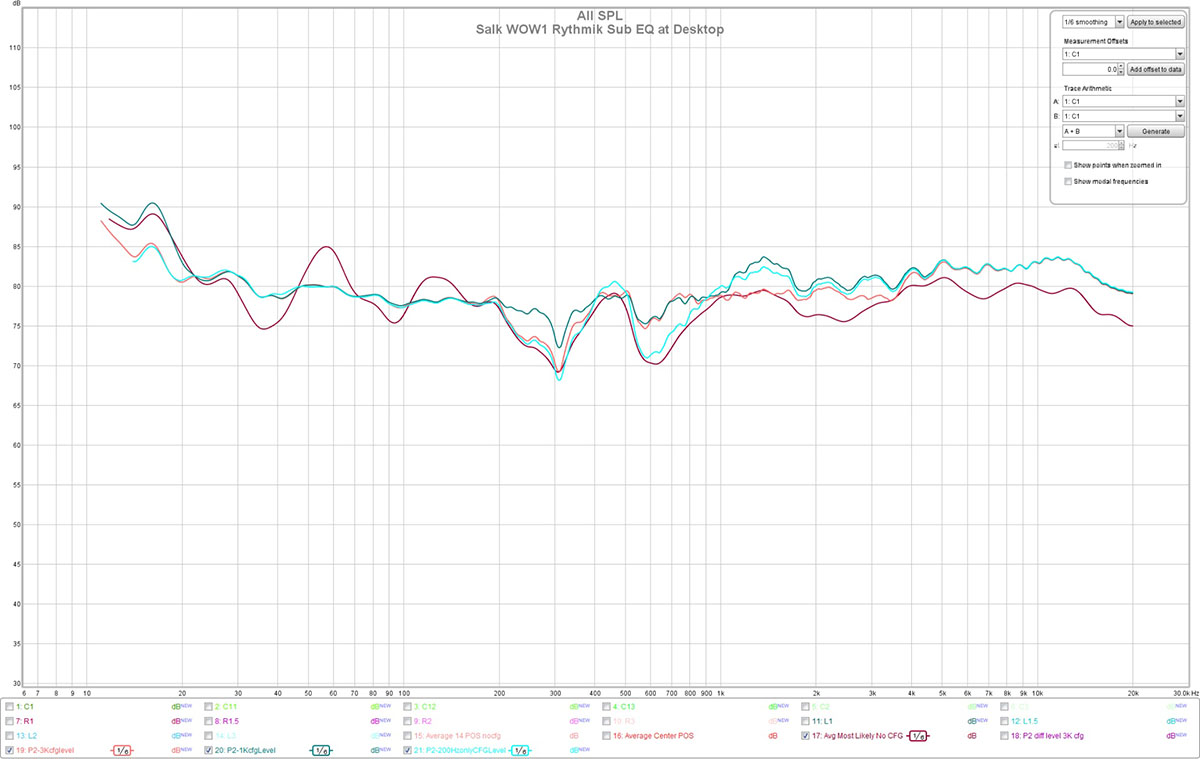
You can see the details of each trace in the legend. Expanding on that, the red line is an average of many readings centered around my normal listening position. The other lines show the effect of EQ calculated by REW and applied by Equalizer APO. The Salks are running with the 1 Ohm resistors, trimming the tweeter response by about 1 DB above 2-3K. Corrected we're getting pretty close to plus or minus 5 dB throughout the spectrum with 1/6 smoothing applied. Even uncorrected is not that bad. I'm still working on the mess between 250 and 1K hz, I think the desk & monitor are major offenders there. REW can't correct the null around 300 hz at all for technical reasons related to "minimum phase". It can partially correct the issues between 400 and 800 as you see from the two traces where I allow REW to tackle that area.

This is an older plot that included left and right positions which make things much messier (the monitor gets in the way). The blue line shows the uncorrected Salk/Rythmik response averaged from 12 positions. The purple line shows the response averaged over 4 mic positions with Equalizer APO/REW bass flattening. Smoothing is 1/48th for both lines, and the Salks are running with the 1 ohm resistors which bring the tweeter down about 1 dB from stock levels. The slightly higher treble levels on the purple line are due to the center mic positions used for those 4 measurements. The 12 position measurements were right ear, middle, and left ear at 4 different distances. The L/R measurements are lower in the treble as you would expect.
Changing gears from desktop to great room...
I was looking for L/R/C speakers to replace/upgrade my great room setup. The previous setup included 2 PSB alphas plus the higher-end alpha-compatible center channel (PSB 200c) from 10-15 years ago. I am using a big 15” def tech sub.
The primary problem was trying to solve was the intelligibility of dialog in the room, but also like excellent sound for music. Things sound boomy and echoey in the room. The room and household realities present some significant problems.
Hardwood floors glued to concrete
One 9x9 rug in the listening area made of carpet and I can’t really go thicker due to mobility issues with an elderly member of the household
Sheetrock/drywall wall construction
High ceiling
Open kitchen area behind the listening area
Adding to the challenges, speaker placement is severely constrained; I can come maybe a foot away from the walls for L/R. The center needs to be placed on a console under a wall-mounted TV, and the sub placement options are also severely limited; it needs to be next to the right speaker.
Within the constraints of the room here is what I’m looking for:
Dialog intelligibility within the problem room
Good match to rock/alternative/folk music, natural sounding voices; I don’t listen to much classical or jazz
Excellent soundstage/imaging
Neutral sounding but forgiving of modern recordings
Specifically, I don’t want to hear a treble emphasis
OK with Onkyo higher-end/THX receiver providing power; iPod, blu-ray, DirecTV, and CDs as sources
Here’s what I’ve heard so far or have, and what I think:
- PSB Alpha setup described above: These sounded pretty good in my old, smaller and carpeted AV room. I had the center channel mounted above the TV and flush with the front, and I think that speaker was somewhat designed with that in mind. The alphas can’t handle percussion as loud as I occasionally listen, they bottom out. The overall tonality of the speakers isn’t bad.
-Snell E3: (I own these and they are set up in a different room). I conceivably could put these in the great room but would need a suitable center channel, but let’s assume I’m buying new. This linked review does a pretty good job of covering the strengths & weaknesses I feel the speaker has; it’s too “forward” and a bit bright for what I want. Soundstage is just not good in most situations.
- GoldenEar Triton 1 & Triton 2: Listened to these locally in questionable rooms with questionable placement; i.e., probably too close to the back & side walls. I had them turn the subwoofer settings way down (8 or 9 o’clock instead of 11 or 12). I kind of liked the sound but the bass seemed to lack articulation and vocals were a bit too recessed. The treble was very smooth and maybe a bit too laid back. Soundstage seemed good. I like the idea of these in that I could forgo the sub, but I think these are too big would need to be too far away from the wall in my space.
-GoldenEar Aon 2: Bought these used and listened to and experimented with them in the room over the Labor day weekend. Musically they are smoother than the alphas but I’m just getting a bit more mid-base than I want in the room. Had trouble getting them to sound decent with the alpha center channel or even by themselves on some TV material. I think pulling them way away from the wall would help but I can’t really do that. Going to try them as nearfield computer speakers next. Update: Too much bass when used in my nearfield setup, close to the wall.
-B&W: Listened to various models at two different stores. The $7500 (model #) sounded best, and the 683 towers were next best and more within my price range… I have seen negative comments about the B&W center channel that would naturally go with the 683s and am going to continue looking. CM10s ($3500 pr?) were OK but I found the treble to be too much on those, and most of the B&W series.
-PSB X2T: Not bad, let’s call them contenders at a reasonable $1300/pr. Heard these in a good, acoustically treated room though not ideally placed. Nothing really offensive about them. I don’t recall the imaging being great. One concern about these is that I don’t know that PSB has a center channel speaker that’s going to be any better than what I already have.
- Sonus faber Liuto towers: Didn’t get a full listen but they were in the same room as the PSB X2T’s and they were in the optimal listening location. As the fates would have it, the speakers were bi-wired incorrectly at the amp, and trying to solve this issue, as well as how to get my iPod connected so I could hear familiar material, wasted most of the limited amount of time I had at this shop. All that said, from the limited listening I was able to do, these may be the best I heard. They are “on sale” at $4,500/pr from $6k, and might be worth it. I’m concerned about their center channel offering and I think placement in my room is likely to be an issue.
After considering all the above, I took a chance and went with internet direct “Ascend Acoustics” primarily due to their monster center channel Sierra Horizon. Right and left were the Sierra Towers. I posted pictures here on the Ascend forum. See this page for pictures and information.
Sound and Vision top speaker picks
Aperion tower review and another and another and S&V and MFR link. Aperion small speakers.
Goldenear subs & comparisons, a REL sub
Internet Direct:
Philharmonic AudioGIK Acoustic panels (art panels)
Monitors for nearfield (Discussion thread)
ATC SCM7 (not available in US?)
KEF R100 talk and Q300B
Ariel 5B $$$
| bass | range in Hz |
| sub bass | 31 to 62 (and lower) |
| mid bass | 62 to 125 |
| upper bass | 125 to 250 |
| midrange | |
| lower midrange | 250 to 500 |
| mid midrange | 500 to 1K |
| upper midrange | 1K to 2K |
| treble | |
| lower treble | 2K to 4K |
| mid treble | 4K to 8K |
| upper treble | 8K to 16K (and higher) |
|
|
|||||||
|
|
|
|
|
|
|
||
|
Internet Direct Speaker Brand Comparison Buying speakers from an Internet direct dealer can be a great option. But, sometimes there are hidden fees that you wouldn't find at a brick & mortar store. We did ... |
|||||||
|
Preview by Yahoo |
|||||||
|
|
|||||||
|
|
|||||||
|
|
|
|
|
|
|
||
|
How to Listen to and Compare Loudspeakers in a Retail St... Shopping for and auditioning speakers can be a daunting experience for newcomers to home theater, and even some veterans. There are a myriad of brands, styles, pric... |
|||||||
|
Preview by Yahoo |
|||||||
|
|
|||||||
|
|
|||||||
|
|
|
|
|
|
|
||
|
Identifying Legitimately High Fidelity Loudspeakers: The... This article explores the economics behind the speaker business and some of the cost cutting approaches loudspeaker companies make to maximize profits while still k... |
|||||||
|
Preview by Yahoo |
|||||||
|
|
|||||||
|
|
|||||||
|
|
|
|
|
|
|
||
|
The Insanity of Marketing Disguised as Loudspeaker Scien... This article is an opinion piece on why you simply cannot declare Speaker XXX is better than Speaker YYY based on a few measurement graphs or so called "DBT's" cond... |
|||||||
|
Preview by Yahoo |
|||||||
|
|
|||||||
Apparently the information below made this page quite popular, so I'll keep it for posterity!
Comcast Remote and how to change the screen size:
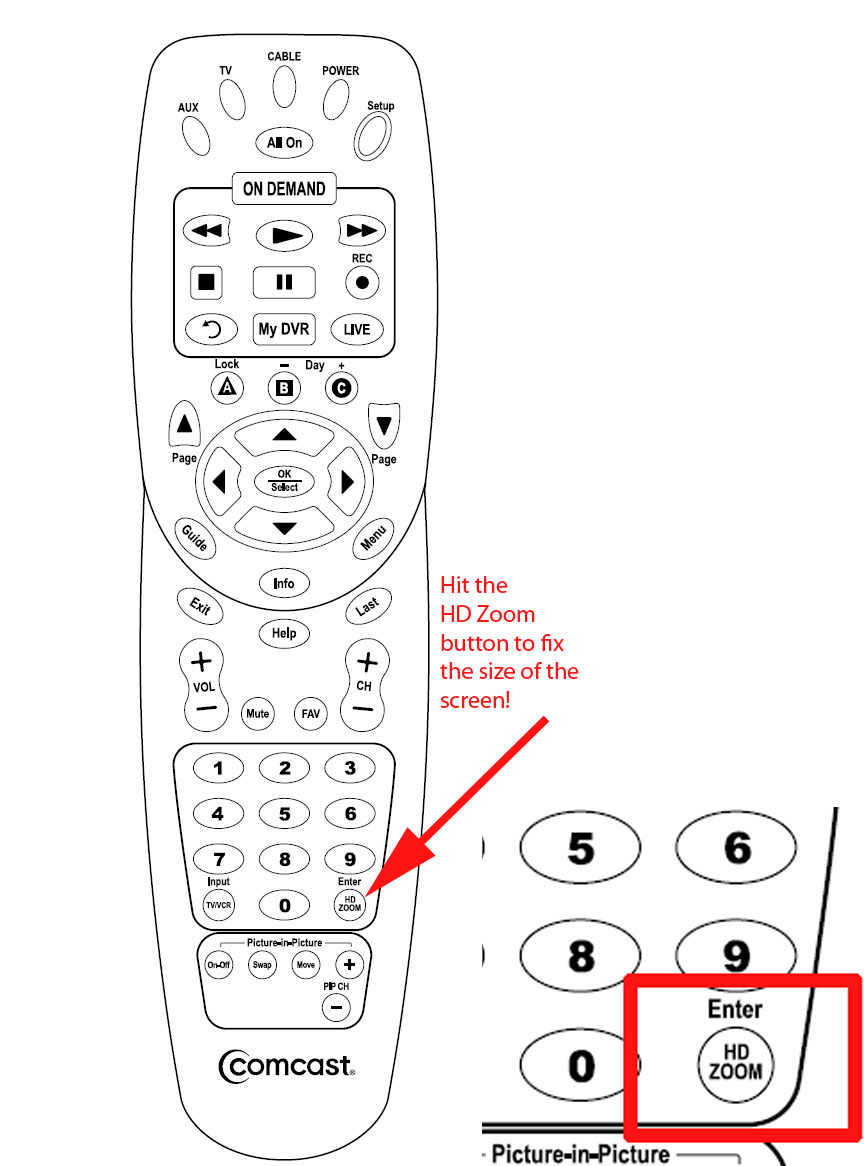
Copyright © Dick Locke. All Rights Reserved.
Contact and Image Use Information
after December 2014 update.